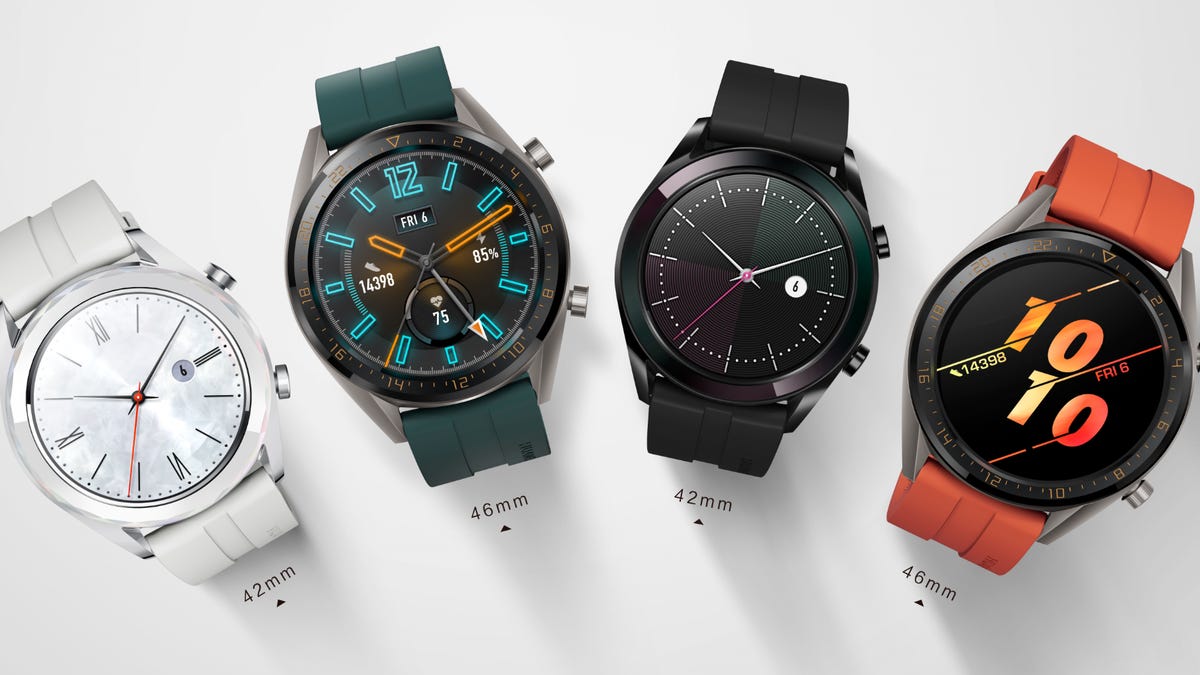Huawei wearables shipments quadruple in first quarter
Apple still has the highest wearables market share, but IDC says Huawei is gaining on it.

Huawei's smartwatch lineup is gaining in popularity.
Huawei is rapidly ramping up its global shipments of wearables.
While Apple is still the biggest seller of wearables globally, the Chinese tech giant shipped 282.2% more wearables in the first quarter than it did a year ago, according to market researcher IDC. In comparison, Apple's year-on-year growth was 49.5%, IDC said.
Huawei's 10% wearables market share ranks third behind Apple's 26% and Xiaomi's 13%, according to the IDC Worldwide Quarterly Wearables Tracker published Thursday.
It's followed by Samsung , with 9% market share and 152% growth, and Fitbit , with 6% market share and 36% year-on-year growth in shipment volume.
Read: Huawei doesn't need the US, hits 50% growth in phone sales
Almost 50 million wearables were shipped during the first quarter -- 12.8 million from Apple, 6.6 million from Xiaomi, 5 million from Huawei, 4.3 million from Samsung, 2.9 million from Fitbit and 18 million from other brands.
According to IDC, wearables are seeing more sales thanks to the popularity of wireless ear devices like AirPods , Galaxy Buds and Beats headphones.
"The elimination of headphone jacks and the increased usage of smart assistants both inside and outside the home have been driving factors in the growth of ear-worn wearables," Jitesh Ubrani, IDC Mobile Device Trackers research manager, said in a statement.
Xiaomi's popularity is thanks to its Mi Band , IDC said, while Huawei and Samsung ship ear-worn wearables bundled with their phones .
Across smartwatches and wrist wearables alone, Xiaomi has the highest global market share with almost 11%, Apple follows with 9%, Huawei is third with 8%, Fitbit sits at around 6% and Samsung holds down just 4% of the market.
"However, with the recent uncertainty surrounding the company's future in smartphones, the outlook for the wearables side of the business will also remain in flux," IDC said about Huawei.
Read: Huawei ban: Full timeline on how and why its phones are under fire
Earlier this month, the US blacklisted networking gear from Huawei, and President Donald Trump signed an executive order essentially banning the company in light of national security concerns that Huawei had close ties with the Chinese government, a charge the company has denied repeatedly.
Hardware and software vendors are continuing to flee Huawei, with Google last week locking Huawei out of its Android updates -- though the US Commerce Department granted Huawei a three-month general license to update existing devices, temporarily easing restrictions on the company's access to US components -- Amazon Japan reportedly no longer selling Huawei devices, and Microsoft also reportedly removing Huawei's MateBook laptops from its online store.
Huawei scientists have also been banned from reviewing science papers from US-based publisher the Institute of Electrical and Electronics Engineers.
Huawei filed a motion in US court Tuesday to have US legislation that bars federal agencies from buying its products ruled unconstitutional.
Huawei reprtedly has no immediate plans to launch its own OS, which may be called "Hongmeng," and that the company is saod to be looking at launching one only if Android is permanently removed as an option for its smartphone customers.
Last Friday, Trump reportedly told the press that he could use an offer to reverse the blacklisting of Huawei as leverage in the escalating Chinese-American trade tensions.

